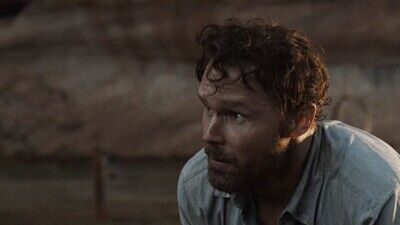Writer/director Barnaby Clay successfully keeps viewers on our toes, even if a lot of his movie feels like a series of programmatic jabs at our complacence. Clay’s surreal drama isn’t stillborn as much as it’s emotionally uninflected and monotonous. Squirming emotions, about fatherhood and attendant feelings of inadequacy, are frequently produced, but not much is required of viewers, except to wince and repeat.
The boy from the first scene is part of a tribe of grimy and gleefully sadistic children. This group isn’t the main subject of “The Seeding.” More like a crucial plot device and symbolic clothesline. Wayward hiker Wyndham Stone (Scott Haze) follows one of the boys against all genre-savvy common sense. He quickly gets lost and stumbles into a desolate canyon, populated by a single woman, Alina (Kate Lyn Sheil) and inaccessible beyond a retractable ladder and some rope.
Wyndham repeatedly injures himself while attempting to escape; Alina encourages him to be like her and accept his fate. He asks her questions, but she only says so much. The boys sometimes appear over the canyon’s edge; they either curse Wyndham or give him false hope. He gives in to his unyielding partner, and slowly loses his mind in the process.
In his second feature, Clay (“Shot! The Psycho-Spiritual Mantra of Rock”) processes a mess of icky emotions with a sensibility that he mostly magpied away from other movies. Clay, in a director’s statement, cites influences that range from “environmental/elemental thrillers,” like “Deliverance” and “Picnic at Hanging Rock,” to “psychological horror” movies like “Rosemary’s Baby” and “The Texas Chainsaw Massacre.”
Those inspirations show, and so do a few others, as in a nightmarish sex scene that brings to mind the dreamy meltdowns of both David and Jennifer Lynch. “The Seeding” is also divided into chapters named after the lunar cycle—“Sturgeon Moon,” “Harvest Moon,” “Cold Moon”, etc.—and illustrated by the inevitable rot of a basketful of perishables, including some unwashed carrots, a potato, and also a dead bird.
Clay’s eagerness to displease shows a little too often, which makes it difficult to suspend one’s disbelief during Wyndham and Alina’s already patience-testing dialogue exchanges. She obviously doesn’t exist just to serve his needs, and that’s basically the root of the movie’s paranoiac tension. She controls his fate and won’t really say why; he doesn’t like that.

